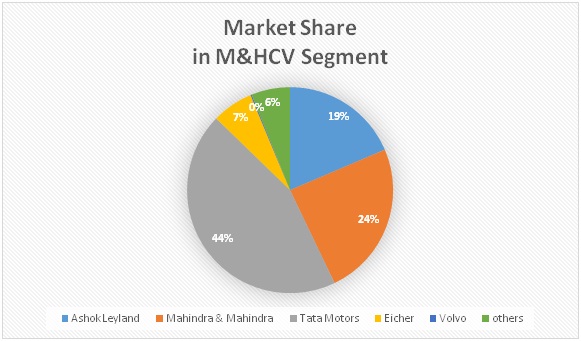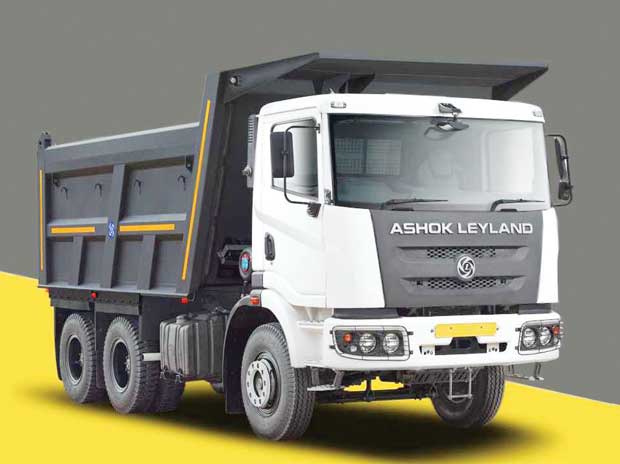Ashok leyland is known very well for the manufacturing, marketing and distribution of commercial vehicles. It is one of the top most commercial vehicles suppliers in India and has robust products which are trusted. Most B2B logistics companies use trucks and heavy vehicles of Ashok Leyland. Ashok Leyland operates out of Chennai in India. It is the flagship company of the Hinduja group.
Ashok Leyland is engaged in manufacturing and marketing of commercial vehicles. It is the flagship company of The Hinduja Group. It . It is headquartered in Chennai, India. The company generated revenues of INR 153,408 million on FY 2015, growing 33.6% year on year.
Table of Contents
Strengths in the SWOT Analysis of Ashok Leyland :
The leader in domestic market: Ashok Leyland had a strong market share (28.6%) in the medium and heavy commercial vehicle segment in FY2015. It is the 2nd largest manufacturer of commercial vehicles in India, also it is the 4th largest manufacturer of buses in the world. Thus, the strong market position in different domains gives the company a better brand image and wider customer base.
Strong product portfolio: Ashok Leyland has forayed into a various segment of heavy, medium and light vehicles which includes buses, trucks, defence vehicles, etc. The company also offers diesel engines for industrial, marine and generator applications. The strong product portfolio expands the customer base and market share.
Robust manufacturing capabilities: The strong manufacturing facilities of Ashok Leyland has spread all over India. It also has facilities in the UK, Czech Republic, and the UAE. This helps the company to maintain economies of scale.
Weaknesses in the SWOT analysis of Ashok Leyland
Heavily dependent on the domestic market: In FY 2015, Ashok Leyland generated 87.3% of its revenues from the domestic market. This makes it vulnerable to any economic and political changes in the country. This gives an advantage to its prime competitor Tata Motors which operates through a wider revenue base geographically.
Termination of JV with Nissan: In 2016, a Japanese company, Nissan Motor Company terminated the 3 JVs signed with Ashok Leyland, ending 8-year-old business relationships. There were also lawsuits filed against each other creating an unamicable atmosphere. Such instances can make the company weak as it hurts the image of the company and also affects the financial condition as well as operations.
Opportunities in the SWOT analysis of Ashok Leyland
Growing global automotive industry: The Global automotive industry has shown constant growth in the recent years and thus creates an opportunity for Ashok Leyland to grab upon. The company should focus on tapping the opportunities created in the global market, especially in the emerging countries to take advantage of the growth in the industry and with it expand its footprint over the globe.
Expanding Product portfolio: With its focus on research and development, Ashok Leyland should look forward to expanding its product portfolio like it has done in the recent past by introducing different heavy and medium commercial vehicles. This helps in expanding its market and provides a competitive edge.
Exports: Many of the competitors have become wary of Ashok Leyland as it as entered exports of its products in a big way and a bright future is expected of Ashok Leyland.
Threats in the SWOT analysis of Ashok Leyland
Intense competition: Ashok Leyland faces competition from companies like Tata Motors, Mahindra & Mahindra, Eicher Motors, Marcopolo, etc. The government has allowed 100% foreign equity ownership in manufacturing vehicles industry which also leads intensifying competition.
Environmental Regulations: The industry is subjected to constant changes and up gradation in the environmental regulatory requirements. The company has to comply with regulations regarding emission levels, noise, safety and pollutant levels. Such regulations increase compliance costs which could also affect the pricing strategy of the company.
Volatility in supply affects profitability: Some of the important commodities used in manufacturing automobiles, including steel, aluminium, copper, zinc have been extremely susceptible to price changes in the recent years because of the supply-demand difference. This affects the profitability of the company directly.
Liked this post? Check out the complete series on SWOT


